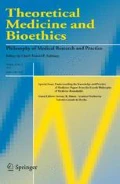Abstract
The maxim “parents should do what is in the best interests of their child” seems like an unassailable truth, and yet, as I argue here, there are serious problems with it when it is taken seriously. One problem concerns the sort of demands such a principle places on parents; the other concerns its larger social implications when conceived as part of a national policy for the rearing of children. The theory of parenting that creates these problems I call “optimizing parentalism.” To avoid them, I define and defend a new and more morally appealing theory, “satisficing parentalism.”
Similar content being viewed by others
Notes
Of course, best interest should be understood holistically, as optimizing the satisfaction of some combination of interests, and not, as my example suggests, optimizing the satisfaction of interests, considered individually. This is an extremely important qualification, but I shall not pursue it here.
Consequentialism is not only a theory about rightness but also obligation. Rightness depends on the goodness of consequences, and we are obligated to do what is right, thus conceived.
There is an additional problem with optimizing that I will not discuss here related to families with more than one child. If parents optimize for one child, they may not be able to optimize for the others.
This is not to deny that there is a sense in which parenthood is autonomy-enhancing as well.
See Norman Daniels’ distinction between restricted Ideal Advocates and unrestricted Ideal Advocates in [6, pp. 234-238].
References
Salter, Erica K. 2012. Deciding for a child: a comprehensive analysis of the best interest standard. Theoretical Medicine and Bioethics. doi:10.1007/s11017-012-9219-z.
Slote, Michael, and Philip Pettit. 1984. Satisficing consequentialism. Proceedings of the Aristotelian Society 58(suppl.):139–176.
Bradley, Ben. 2006. Against satisficing consequentialism. Utilitas 18: 97–108.
O’Neill, Onora. 1979. Begetting, bearing, and rearing. In Having children, ed. O. O’Neill, and W. Ruddick, 25–38. New York: Oxford University Press.
Little, Margaret. 2003. The morality of abortion. In Ethical issues in modern medicine, 6th ed, ed. B. Steinbock, J. Arras, and A. London, 492–500. Boston: McGraw Hill.
Daniels, Norman. 2008. Just health. New York: Cambridge University Press.
Bronfenbrenner, Urie. 1972. Who cares for America’s children? In The future of the family, ed. L.K. Howe, 139–150. New York: Simon and Schuster.
Acknowledgments
I thank Adrienne Asch, William Ruddick, and David Wasserman for their help, both in conversation and in written comments.
Author information
Authors and Affiliations
Corresponding author
Rights and permissions
About this article
Cite this article
Blustein, J. Doing the best for one’s child: satisficing versus optimizing parentalism. Theor Med Bioeth 33, 199–205 (2012). https://doi.org/10.1007/s11017-012-9222-4
Published:
Issue Date:
DOI: https://doi.org/10.1007/s11017-012-9222-4




